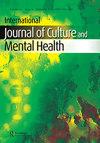Explanatory models and psychiatric pluralism among family members of mentally Ill persons: a narrative inquiry
Q1 Social Sciences
International Journal of Culture and Mental Health
Pub Date : 2017-04-23
DOI:10.1080/17542863.2017.1316753
引用次数: 7
Abstract
ABSTRACT Active involvement of families in mental health care in India is well documented. This study aimed to understand the explanatory models of the family members of persons suffering from common as well as severe mental illness. Narratives were collected through interviews from family members accompanying the patients at a psychiatric clinic. Data were also obtained from professionals at the clinic as well as folk healers. The Constant Comparative Method was used for analysis. The notable findings were: healthcare pluralism at institutional, cognitive and structural levels; conflicting explanatory models about mental illness; and stigma regarding mental illness. The findings suggest that in addition to explanatory models, the accessibility and availability of healers also plays a major role in treatment choices by the families.精神病患者家庭成员的解释模式与精神多元性:一个叙事探究
在印度,家庭积极参与精神卫生保健是有据可查的。本研究旨在了解普通及严重精神疾病患者家庭成员的解释模式。通过与精神病诊所陪伴患者的家庭成员的访谈,收集了患者的叙述。数据也从诊所的专业人员和民间治疗师那里获得。采用恒定比较法进行分析。值得注意的发现是:制度、认知和结构层面的医疗多元化;相互矛盾的精神疾病解释模型以及精神疾病的污名。研究结果表明,除了解释模型外,治疗师的可及性和可获得性也在家庭的治疗选择中起着重要作用。
本文章由计算机程序翻译,如有差异,请以英文原文为准。
求助全文
约1分钟内获得全文
求助全文
来源期刊

International Journal of Culture and Mental Health
Social Sciences-Cultural Studies
CiteScore
2.10
自引率
0.00%
发文量
0
期刊介绍:
This title has ceased (2018). This important peer-review journal provides an innovative forum, both international and multidisciplinary, for addressing cross-cultural issues and mental health. Culture as it comes to bear on mental health is a rapidly expanding area of inquiry and research within psychiatry and psychology, and other related fields such as social work, with important implications for practice in the global context. The journal is an essential resource for health care professionals working in the field of cross-cultural mental health.Readership includes psychiatrists, psychologists, medical anthropologists, medical sociologists, psychiatric nurses and social workers, general practitioners and other mental health professionals interested in the area. The International Journal of Culture and Mental Health publishes original empirical research, review papers and theoretical articles in the fields of cross-cultural psychiatry and psychology. Contributions from the fields of medical anthropology and medical sociology are particularly welcome. A continuing dialogue between members of various disciplines in various fields is encouraged. The aim of the journal is to encourage its readers to think about various issues which have clouded cross-cultural development of ideas. The journal lays special emphasis on developing further links between medical anthropology, medical sociology, clinical psychiatry and psychology, and implications of the findings on service provisions. The journal is published four times a year. The style of reference is Harvard. All research articles in this journal, including those in special issues, special sections or supplements, have undergone rigorous peer review, based on initial editor screening and anonymized refereeing by at least two independent referees.
 求助内容:
求助内容: 应助结果提醒方式:
应助结果提醒方式:


